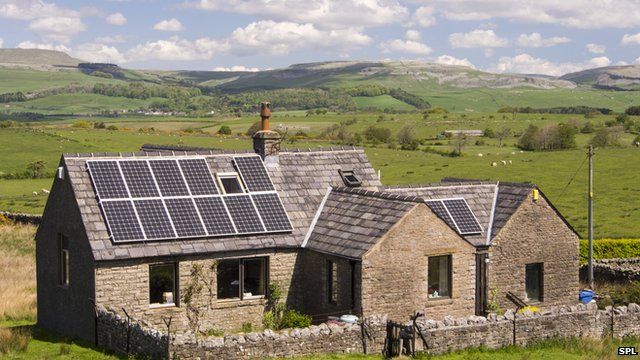Subsidies for small scale solar face steep cuts
- Published

The UK government says it plans to significantly reduce subsidies paid to small-scale green power installations.
Under the proposals, the amount of money paid to home owners and businesses producing electricity from roof-top solar and small wind turbines will be limited from January 2016.
Subsidy schemes could be closed to new entrants from the start of next year.
Ministers want to ensure that consumers who pay for the schemes through their bills get the best deal possible.
They admitted in July that spending on renewable energy schemes was set to be higher than expected.
Having already announced plans to limit cash paid to on-shore wind generation and large-scale solar farms, the Department of Energy and Climate Change (DECC) is now proposing significant cutbacks for small-sized green energy producers.
Solar and wind energy installations of less than 5MW are supported by feed-in tariffs - schemes that pay producers a subsidy for the electricity they generate, plus a bonus for any electricity exported back to the national grid.
Under the new proposals, the amount to be paid from next year will fall to 1.63p per kilowatt hour from a current level of 12.92p for a new residential solar system.
The consultation says that government spending on feed-in tariffs should be limited to between £75m and £100m from 2016 to 2018/19.
But DECC warns that if that limit is breached then "the only alternative would be to end generation tariffs for new applicants as soon as legislatively possible," which is expected to be January next year.
The Solar Trade Association (STA) says the proposals are not good news and the idea that the scheme might end for new entrants could become a self-fulfilling prophecy.
"We regret that proposals to suddenly cut tariffs combined with the threat of closure of the scheme next January will spark a massive market rush," said Mike Landy from the STA.
"This is the antithesis of a sensible policy for achieving better public value for money while safeguarding the British solar industry."
In their risk assessment published with the proposals, the government acknowledges that there is a chance that the changes may result in "significantly reduced rates of deployment" but they expect the industry to prove resilient, and point to the fact that the UK has already exceeded installation levels for small-scale solar and wind that were expected by 2020.
This rapid uptake of the technologies over the past few years means there has been considerable overspend on tariffs, according to the government, and that has to be curtailed.
"Our support has driven down the cost of renewable energy significantly," said a DECC spokesman.
"As costs continue to fall and we move towards sustainable electricity investment, it becomes easier for parts of the renewables industry to survive without subsidies. The consultation launched today is the next part of the action we promised to take to ensure bill payers get the best deal possible".
Environmental groups were not impressed.
Greenpeace pointed out that the government's maximum additional spend on green technologies by 2018 would be approximately half of what it spends subsidising the coal industry.
Other groups called the changes "absurd".
"Of course the feed-in tariff should fall as solar becomes cheaper, but the government clearly plans to remove support entirely," said Alasdair Cameron from Friends of the Earth.
"This is politically motivated, and will take away power from people and hand it back to big energy firms."
The consultation period on the proposed changes will run until 23 October.
Follow Matt on Twitter @mattmcgrathbbc.
- Published22 May 2015
- Published24 March 2015